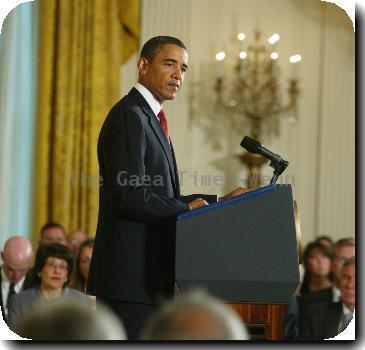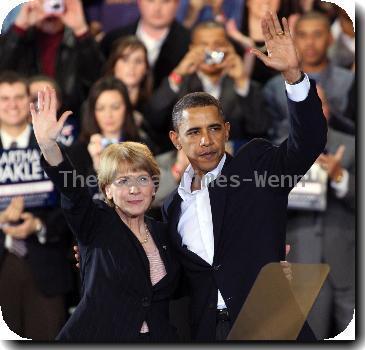Obama administration wants Democrats to drop banking bill fund targeted by Republicans
By Jim Kuhnhenn, APFriday, April 16, 2010
Bank bill in peril, WH urges part be dropped
WASHINGTON — In the face of stiff GOP opposition, Obama administration officials want Senate Democrats to purge a $50 billion fund for dismantling “too big to fail” banks from legislation that aims to protect against a new financial crisis. Republicans contend the provision would simply continue government bailouts of Wall Street.
The sweeping bill aims to prevent a recurrence of the crisis that nearly caused a Wall Street meltdown in 2008. Beside creating a mechanism for liquidating large firms, House and Senate bills would govern previously unregulated derivatives, create a council to detect systemwide financial threats and establish a consumer protection agency to police lending, credit cards and other bank-customer transactions.
President Barack Obama declared Friday that he would veto the bill if it doesn’t regulate the freewheeling derivatives market. “We can’t afford another AIG,” the president said, referring to the giant insurance conglomerate that relied heavily on the complex, sometimes exotic investment instruments.
Separately on Friday, the government accused Goldman Sachs & Co., Wall Street’s most powerful firm, of defrauding investors by failing to disclose conflicts of interest in mortgage investments it sold as the housing market was collapsing two years ago.
One senior Treasury official said Friday that the fund for dismantling giant failing banks, which would be financed by large financial institutions themselves, is unnecessary. He said the costs of dismantling the firms could be recouped from the industry after a liquidation.
If the chairman of the Senate Banking Committee, Christopher Dodd, D-Conn., complies, that would remove one component of the bill that Republicans have persistently used to rally opposition. But it was unclear whether that step alone would yield any Republican votes.
Senate Republicans stood solidly against the bill Friday after GOP leader Mitch McConnell persuaded Susan Collins, R-Maine, to join 40 fellow lawmakers in expressing their opposition and demanding further negotiation.
The legislation would for the first time regulate derivatives, the instruments such as mortgage-backed securities that contributed to the near meltdown when their value plummeted during the housing crisis.
Obama said he wants derivatives to be strongly regulated, and he added that he’s ready to veto any financial regulation bill that comes to his desk without it.
But there’s some dispute among Democrats about how far such regulation should go.
And the unified Republican opposition strengthened the hand of their Senate leader, McConnell of Kentucky, as Democrats prepare to bring the legislation to the floor for debate. The majority Democrats had been hunting for individual Republicans to peel away from their party caucus to help gain the 60 votes that would be needed to overcome a likely GOP procedural roadblock.
“We are united in our opposition to the partisan legislation reported by the Senate Banking Committee,” the Republicans said in a letter to Senate Majority Leader Harry Reid, D-Nev.
McConnell has portrayed the legislation as a continuation of bailouts and as a partisan measure heavily influenced by the White House.
But the most contentious provision, the $50 billion fund, was the result of bipartisan negotiations between Banking Committee members Mark Warner, D-Va., and Bob Corker, R-Tenn.
On Thursday, Corker, too, suggested that given the furor, Democrats should simply drop the fund from the bill.
The argument for paying up front for liquidation costs of a failed big bank is that it would reduce the amount the Federal Deposit Insurance Corp. would have to borrow from the Treasury Department to dismantle large firms. But the administration has said all those costs could be recouped from the financial industry after the fact without keeping taxpayers on the hook for the expense.
Also on Friday, the chairwoman of the Senate Agriculture Committee, Sen. Blanche Lincoln, D-Ark., issued her version of derivatives legislation — a proposal that goes beyond the pending banking bill by requiring large banks to spin off their derivatives trading operations.
That provision would especially hit banks such as Goldman Sachs and JPMorgan Chase, and bank lobbyists said they were prepared to fight it.
The Treasury official said the administration preferred language in the Senate Banking Committee bill that would restrict overall proprietary trading by large banks, not just derivatives trades. That provision, however, would require a council of regulators to first study how to implement such a regulation. Lincoln’s proposal is more specific.
The Treasury official spoke on condition of anonymity to describe positions the White House was not ready to take publicly.
Tags: Barack Obama, Chase, Goldman sachs, Government Regulations, Industry Regulation, North America, Political Organizations, Political Parties, United States, Washington







